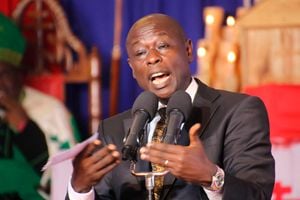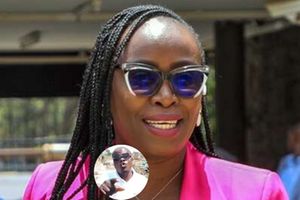Succession talk begins as generals face exit

File | NATION
Chief of the general staff Jeremiah Kianga, (Centre ) and Air Force commander Maj-Gen Harold Tangai (left).
What you need to know:
- Top military men may step down after attaining retirement age or serving four-year terms
Succession of the country’s top military generals is causing anxiety within the ranks after it became apparent some of them are due to retire in keeping with administrative rules.
The chief of general staff (CGS) General Jeremiah Kianga turned 60 on April 26, igniting speculation about his retirement in accordance with rules put in place by one of his predecessors, Gen Daudi Tonje.
According to the Tonje rules, the CGS should retire at 62 years or after serving for four years. Gen Kianga was appointed to the position in August 2005.
His deputy Lt-Gen Julius Karangi is already past the mandatory retirement age of 58 when officers in that rank should retire unless they are promoted to the next position.
Downplayed issue
But the Department of Defence downplayed the issue of succession anxiety. Spokesman Bogita Ongeri said the CGS had until September 2011to retire, adding that he serves at the pleasure of the President, who is the commander-in-chief of the armed forces.
“There are internal administrative arrangements of age and rank which determine how long officers stay in the military, but all these are subject to the discretion of the President,” Mr Ongeri said.
But he conceded that the retirement of the CGS would affect many other officers.
Gen Kianga was born April 26, 1950. He went to Machakos secondary school and left in 1970. He joined the military in April 1971.
After two years of cadet training at the Royal Military Academy at Sandhurst in the United Kingdom, he was commissioned and posted to the 5th Kenya Rifles as a platoon commander in 1973.
He did regimental duty up to 1975. He has been trained in Kenya, the UK, India and at the University of Kansas in the United States where he obtained a master’s degree in military arts and science.
Lt-Gen Karangi joined Kenya Air Force in 1973 and after cadet training in the UK received his commission in 1974. After qualifying as a flight navigator in October 1975 in the Royal Air Force in England, he was posted to the Flying Wing, Kenya Air Force, where he worked as a navigator.
Like his boss, Lt-Gen Karangi has been trained in Kenya, the UK, India and the US. He has served as officer in charge of the management of American Military Aid to Kenya and officer in charge of the Research Department in Defence.
Also facing retirement unless promoted are Maj-Gen Harold Tangai and Maj-Gen Samson Mwathethe, who command the Air Force and Navy respectively. The two have served in their positions for the last four years.
Maj-Gen Tangai was born on February 27, 1956.
Last Tuesday, Lt-Gen Karangi called a press conference to talk about the impending recruitment of servicemen and women. The move led to speculation in military circles that the CGS was preparing to relinquish office as the recruitment of soldiers is usually left to other officers.
DoD usually buys newspaper space to announce centres and dates for the recruitment.
The succession talk comes about a month since the promulgation of the new Constitution which stipulates that Parliament approves those picked to head the military.
Efforts by the Sunday Nation to speak to Gen Kianga failed as he was reported to be in meetings and did not return our calls. Defence minister Yusuf Haji was reported to be in his Ijara constituency, while assistant minister David Musila was busy at the Commonwealth Parliamentary Association meeting which ended yesterday in Nairobi.
According to administrative rules set by Gen Tonje, officers at the rank of major-general retire after turning 55. If they are service commanders, they serve a maximum of four years.
It is only Army Commander Lt-Gen Jack Tuwei and Lt-Gen Jones Mutwii whose terms are yet to end. Lt-Gen Mutwii, who has been on contract for the last three years, was promoted last year to head the National Defence College (NDC) after a stint as Deputy Army Commander.
Lt-Gen Tuwei took over the reins at the Army after Lt-Gen Augustine Njoroge left in December 2008.
DoD would not comment on when the Defence Council will meet to deliberate on the succession issue.




